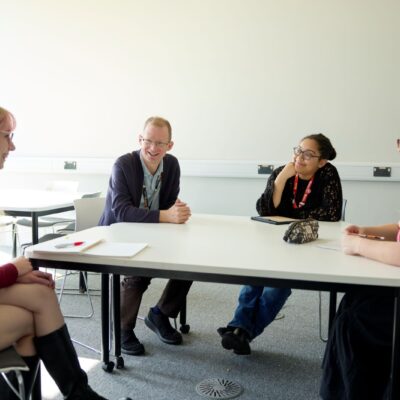

International Education (Top-Up) BA (Hons)
Key Facts
-
Level
UndergraduateUG BA (Hons)
-
Duration
1 year full time
-
Starting
September
SEP
-
Full Time: £9,535
-
Full Time: £17,000
-
Waterside
Updated 21/11/2025
Updated 21/11/2025
Get in touch
For questions regarding study and admissions please contact us:
UK STUDENTS ENQUIRIES
study@northampton.ac.uk
0300 303 2772
INTERNATIONAL STUDENTS ENQUIRIES
Overview
Three compulsory modules provide the core knowledge and skills. In English Use and Intercultural Communication you will explore how to communicate effectively across cultures. English Language Teaching in International Contexts develops understanding of theories of language acquisition and learning and their application. The Research Project allows you to show a comprehensive and critical understanding of your chosen topic focused on education and intercultural communication.
Highlights
- Study English language with the key theoretical and practical issues involved in the field of TEFL or intercultural communication.
- Opportunity to take the Cambridge English Certificate in Teaching English to Speakers of Other Languages (CELTA).
- Opportunity to visit local nurseries/pre-schools and have a ‘student buddy’ if choosing early years modules.
Entry Requirements
Applications are welcomed from students with a HND or equivalent qualification in one of the following subjects: English, Linguistics, Applied Linguistics, English Language, Business English, English Literature, TEFL, English and Education, Education Studies, Early Childhood Studies, or Intercultural communication.
All International and EU students applying for a course with us must meet the following minimum English language requirements:
- IELTS 6.0 (or equivalent) with a minimum of 5.5 in all bands
for study at undergraduate level - If applying for Early Years Studies then you will be required to have an IELTs score of 6.5
For information regarding English language requirements at the University, please see our IELTS page.
Course Content
This course gives you the opportunity to top-up HND/ or Diploma level qualifications (or equivalent) to a full honours degree. Students with a background in the following subjects will be considered: English, linguistics, applied linguistics, English language, Business English, English literature, TEFL, English and Education, Education studies, Early Childhood Studies, Intercultural communication.
The course focuses on a comprehensive awareness/understanding of Education and on English Language use and teaching in a global context. You will develop your knowledge, skills and practice to a high level through this Top-up course which will enable you to gain employment in a range of international educational contexts, from English Language teaching in schools, kindergartens to Educational Leadership, Education Consultancy and Teacher Training.
Please note the modules shown here relate to the academic year 25/26. The modules relating to the academic year 26/27 will be available from June 2026.
-
International Education and English as a Medium of Instruction (20 Credits)
Module code: EDU3077Status: CompulsoryThis module explores different dimensions of English as a Medium of Instruction (EMI). It examines the opportunities and challenges associated with EMI policy-making, its implementation and impact on teaching and learning in a global context. It aims at raising awareness of linguistic and cultural diversity and developing strategies to support teaching and learning.
-
English Use and Intercultural Communication (20 Credits)
Module code: EDU3041Status: CompulsoryThe purpose of this module is for students to explore intercultural competence with a view to developing and enhancing their strategies to communicate effectively across cultures.
-
Challenges and Opportunities in English Language Education (20 Credits)
Module code: EDU3078Status: CompulsoryThe purpose of this module is to examine challenges and opportunities arising when teaching English and leading teams in global educational contexts. It aims at building awareness on language and society, emerging technologies and professional identities, and empowering students to develop strategies to manage expectations and maintain effective learning environments.
-
Research Project (20 Credits)
Module code: EDU4009Status: CompulsoryThe purpose of this module is for students to produce an extended piece of work which explores in depth a topic focused on education and intercultural communication. Students will conduct independent research in order to demonstrate a comprehensive and critical understanding of their chosen topic.
-
Education, Heritage and Communities (20 Credits)
Module code: EDU3069Status: DesignatedThis module provides an exploration of the term heritage as distinct from traditional forms of historical assets, focusing on the ethnic and cultural aspects used to create and communicate historical and cultural narratives. Students will develop practical knowledge of the diverse roles of education in contemporary heritage and community practices.
-
Education, Culture and Society (20 Credits)
Module code: EDU3004Status: DesignatedThis module critically examines cultures within educational institutions and wider, socio-economic dimensions relating to children, young people and families. It is sociologically based but also draws upon the economic and business models, and the philosophy and politics that shape educational establishments and the behaviour of communities.
-
Exploring Deviance and Disaffection (20 Credits)
Module code: EDU3026Status: DesignatedExploring Deviance and Disaffection enables students to explore the diverse nature of deviance and disaffection from the theoretical and applied paradigms relevant to understanding the role of related social justice as it impacts on education, teachers, and learners.
-
Professional Pedagogy in Early Childhood Education and Care (20 Credits)
Module code: EYS3137Status: DesignatedThis module is designed to explore theories, principles and implementation of appropriate curriculum frameworks in Education and Care, including local, national and international dimensions and comparisons. Students will also develop their understanding of the professional roles in supporting the development and wellbeing of children.g.
How will I learn?
For this course you can expect taught study to be a combination of lectures, seminars and workshops.
How am I assessed?
We use a variety of individual and group-based assessments including reports, presentations, posters, portfolios and projects.
Fees and Funding
2025/26 Tuition Fees
- UK Full Time: £9,535
- International Full Time: £17,000
Fees quoted relate to study in the Academic Year 2025/26 only and may be subject to inflationary increases in future years. UON will adjust UK fees annually in line with Government Policy.
There are no additional costs for this course for students beginning their studies in September 2025. Should this change, applicants and students will be contacted by the university with details of the costs.
For information on the scholarships available to you, please see our scholarships page.
For more information about possible funding options, please visit our Fees and Funding pages.
Fees quoted relate to study in the Academic Year 24/25 only and may be subject to inflationary increases in future years.
- UK – Full Time: £9,250
- International – Full Time: £16,500
Special Features
Alongside your modules, you will be able to choose from a range of education-related options.
- In Exploring Deviance and Disaffection you will explore the diverse nature of deviance and disaffection from the theoretical and applied paradigms relevant to understanding the role of related social justice as it impacts on the lives of teachers and learners through academically, experientially and employability informed critically-investigative peer discussions.
- In Education Aims Values and Ethics you will develop your ability to construct and critically deconstruct Philosophy of Education dialogues and arguments whilst developing an understanding of contested education issues so that you are enabled to produce cogently argued positions (on topics that you find personally meaningful).
- In Personal, Academic and Professional Development: Graduate Leadership, you will be involved in the study of the theory and practice of leadership and management techniques used in the provision of Early Years and children’s services.
- Professional Pedagogy in Early Childhood Education and Care will support your further development as reflective Early Years practitioners, who are able to apply your knowledge of theories and principles of child development and organisational and regulatory requirements to your individual practice and pedagogy.
If you are interested in pursuing Early Years career, you will be advised as to the modules most appropriate to your needs.


